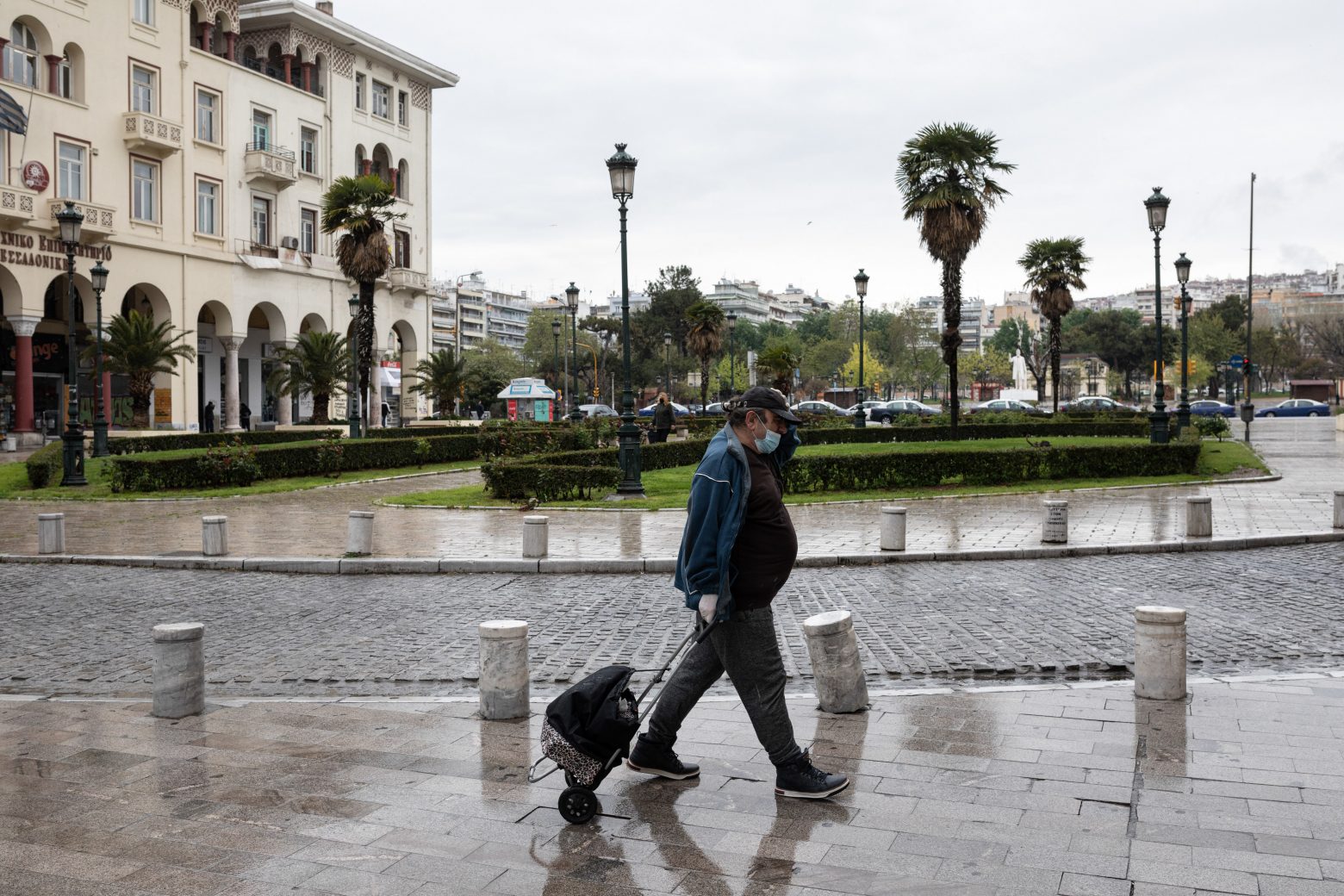
Experts and the government are concerned about the course of the pandemic in Northern Greece. It is characteristic that epidemiologist Gikas Maiorkinis in yesterday’s official information about the coronavirus, spoke of a “worrying exception” of the areas in the north of the country.
The Assistant Professor of Epidemiology, on the other hand, said that in the rest of the country we are in a phase of stabilization and perhaps a slight contraction in relation to the pandemic, which is observed for the fourth consecutive week.
The Deputy Minister of Health, Mina Gaga, also spoke about the increasing trend of cases in Thessaloniki and throughout Northern Greece, adding that from prefecture to prefecture it ranges from 11-36%, something that worries experts especially.
“Autumn is coming and winter is ahead,” Ms Gaga said. “An alarm bell is ringing, we want everyone to be aware that the cases in Northern Greece are rising,” she stressed.
The areas that are in the “red”
As expected, due to the epidemiological data that had become known, three other regions of the country were put under partial lockdown status. As of today, Friday, September 24, the Regional Units of Kastoria, Xanthi and Drama are included in level 4 (red) of the Epidemiological Map of the country.
According to the official announcement from the Civil Protection, the validity of the special, local, measures in the Regional Units of Pieria, Imathia, Pella, Kavala and Argolida is extended, after the re-evaluation of the epidemiological data by the Infectious Diseases Committee and the National Commission. Protection of Public Health against the coronary artery Covid-19 in the context of the epidemiological surveillance of the country by Regional Unit and Municipality on a weekly basis.
Note that level 3 (orange) includes the Regional Unit of Evritania.
The measures that apply
The measures in the areas that have been put in partial lockdown are valid from 6:00 this morning until Friday, October 1, at the same time.
The measures in force are the following:
Traffic ban from 01:00 in the evening until 06:00 in the morning, with the exception of work and serious health reasons.
Prohibition of music around the clock in stores of health interest and entertainment.
It is reminded that in these areas, as well as in the whole territory, it is forbidden to hold any form of events in exchange for any form of reward, with the physical presence of a crowd of more than twenty people in a private, non-professional space. The administrative fine in case of violation amounts from 50,000 to 200,000 euros for the lessee or concessionaire of the private, non-professional space, in which the event in question took place or takes place.
Low vaccination coverage is a “thorn”
Scientists have turned their attention to increasing epidemics in areas of Northern Greece, where temperatures are already lower at night. “Unfortunately, in these areas where lower vaccination rates are recorded, we expect, with considerable certainty, a faster increase in the epidemic, as well as higher morbidity,” said Mr. Maiorkinis. He reiterated that the best way to address this dynamic remains to increase vaccination coverage.
The concern is exacerbated by the fact that on the way to winter, the weather will no longer be an ally. For this reason, the goals of the government are: first, in consultation with the health districts, hospital administrators, Local Government, to make an effort to persuade the citizens to observe the measures and to have stricter controls for their implementation.
And secondly, to convince the citizens to be vaccinated, in order to increase the percentage of vaccinated people who in some areas of Northern Greece are below or just above the psychological limit of 50%. According to data from the 4th Health District, six out of 10 citizens in Northern Greece have not been vaccinated.
Indicatively, the percentage of fully vaccinated reaches:
In Kozani 44, 97%.
In Imathia 42, 05%,
In Drama in 41, 29
In Xanthi 43, 49%
The battle to keep schools open
Among the places that the government and the experts are very interested in are schools. Every effort will be made to keep them open, as this is considered critical for children for learning, psychological and social reasons.
The issue, however, is that the first closed school departments due to coronavirus disease of students is a fact and are located in Northern Greece, and specifically in the 10th Primary School of Neapolis – Sykea. In two classes more than 50% of students got sick.
Based on the protocol of 50% +1 students, their operation was immediately suspended and teaching will continue with distance learning. According to Professor George Pavlakis, such a thing was expected due to the high transmissibility of the Delta mutation. “Since last year we have been saying that the virus was transmitted in schools. “But not like the Delta mutation. The virus is ahead,” he said, while the mayor of Sykeon, Simos Daniilidis, speaking to MEGA TV, referred to the importance of vaccination.
“Things are not going well. Two sections have already been closed. There are dozens of departments in primary schools, in contrast to high schools and lyceums, which have 5-6-7 cases. The children in the primary schools, in each department are 18-19-20 children, so to close the department we have to wait for the cases to go up. The children are taking tests, it turned out that they were positive”, said Mr. Daniilidis.
“In high schools, a significant number of children have been vaccinated. This phenomenon does not occur in high schools and lyceums. It is the positive result of vaccination. This should convince parents to get their children vaccinated. We hold informative meetings and campaigns, in order to convince the adults “, he added.
The bad but realistic scenario for how many children will get sick
The assessment of the professor of Environmental Engineering of the Aristotle University of Thessaloniki, who was invited to comment on his position on the children who will be ill by the end of the year, is literally terrifying. We remind you that the professor had stated yesterday to SKAI TV that 12,000 children will get sick. In an interview with the radio station Parapolitika 90.1, Mr. Sarigiannis clarified that this is a good scenario.
The professor noted that this is not the realistic scenario. “This is a good scenario because the realistic scenario is 74,000. We are talking about the whole country, at the moment the trend that is developing is that it is possible that by the end of the year, on average, 44% of the new cases to be children under 18 “, stressed Mr. Sarigiannis.
Latest News

WTTC: Travel & Tourism to Create 4.5M New Jobs in EU by 2035
This year, international visitor spending is set to reach 573 billion euros, up by more than 11% year-on-year

IMF: US Tariffs Shake Global Economy, Outlook Downbeat
IMF slashes global growth forecast to 2.8% as U.S. tariffs create uncertainty and ‘negative supply shock

First Step Towards New Audiovisual Industry Hub in Drama
The project is set to contribute to the further development of Greece’s film industry and establish Drama as an audiovisual hub in the region

Airbnb Greece – Initial CoS Ruling Deems Tax Circular Unlawful
The case reached the Council of State following annulment applications filed by the Panhellenic Federation of Property Owners (POMIDA)

Mitsotakis Unveils €1 Billion Plan for Housing, Pensioners, Public investments
Greek Prime Minister Kyriakos Mitsotakis has announced a new set of economic support measures, worth 1 billion euros, aiming to provide financial relief to citizens.

Alter Ego Ventures Invests in Pioneering Gaming Company ‘Couch Heroes’
Alter Ego Ventures' participation in the share capital of Couch Heroes marks yet another investment by the Alter Ego Media Group in innovative companies with a focus on technology.

Corruption Still Plagues Greece’s Driving Tests
While traffic accidents continue to claim lives on Greek roads daily, irregularities and under-the-table dealings in the training and testing of new drivers remain disturbingly widespread

Pope Francis Died of Stroke and Heart Failure Vatican Confirms
As news of the official cause of death spread, tributes poured in from across the globe. The 1.4 billion-member Catholic Church is united in grief, remembering a pope who championed inclusion, justice, and compassion

Increase in Both Museum Visits, Revenues for 2024
As expected, the Acropolis was the top archeological site in the country, followed by Sounion, Mycenae, the ancient theater of Epidaurus, and Vergina in northern Greece

Where Greece’s Tourists Come From: A Look at 2025’s Top Visitor Markets
The United Kingdom continues to hold the top spot as the largest source of incoming tourism, with 5.6 million seats booked for Greece this summer — up 2.2% from last year. This accounts for 20% of all international air traffic to Greece












![Πλημμύρες: Σημειώθηκαν σε επίπεδα ρεκόρ στην Ευρώπη το 2024 [γράφημα]](https://www.ot.gr/wp-content/uploads/2025/04/FLOOD_HUNGRY-90x90.jpg)



![Ξενοδοχεία: Μεγάλο το ενδιαφέρον για επενδύσεις στην Ελλάδα – Η θέση της Αθήνας [γραφήματα]](https://www.ot.gr/wp-content/uploads/2025/03/Athens-hotels-90x90.jpg)
























 Αριθμός Πιστοποίησης
Αριθμός Πιστοποίησης